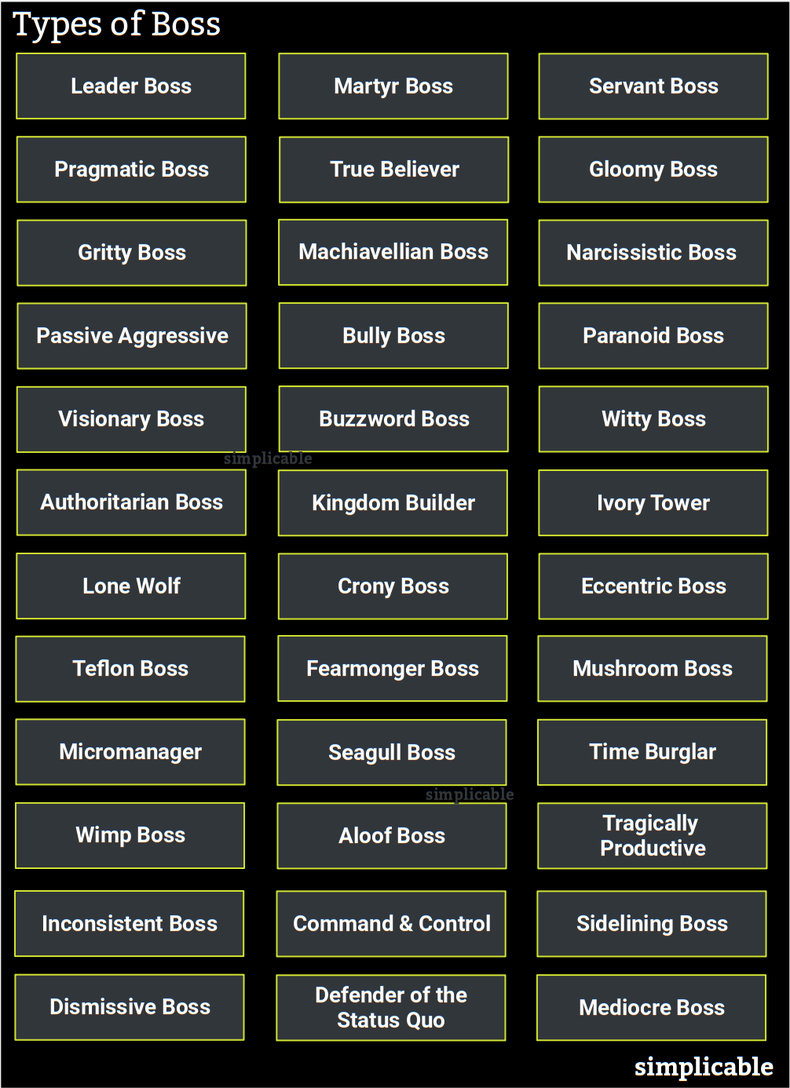

|
top
»
management
»
management style
»
boss
36 Types of Boss John Spacey, September 15, 2020 updated on February 04, 2023
  Leader BossA boss who is a true leader such that they are good at setting direction, managing people, developing a positive team culture and acting as a inspirational example for team members.Martyr BossAn individual who has risen to their management position because they work harder than anyone else and are prepared to make every sacrifice for the company. They get respect and are an order of magnitude more productive than anyone on your team. A martyr boss may be a little disappointed every time you prioritize your life over work and tends to make everyone feel guilty, whether intentional or not.Servant BossThe servant boss has risen to their position by supporting everyone and generally being a useful and authentic person.Pragmatic BossThe boss who just wants to win and is completely flexible, energetic and realistic. The pragmatic boss is prone to criticising, sidelining and firing mediocre employees but is supportive of performers.True BelieverA boss who adopts the mantras of your firm with a dogmatic zeal such that they view criticism of the firm as irreverent. This boss values loyalty and a positive attitude and has risen in your organization with these traits.Gloomy BossBelieves that your organization is fundamentally malevolent or absurd. Views the struggles and politics of a firm with a sense of amusement and detachment. Executes well and is reasonably professional. Has a tendency to embrace outcasts, risk takers and wild independent thinkers. Dislikes true believers (above) and mediocrity.Gritty BossA boss with grit who is both productive and able to take on political challenges by the most fearsome contenders in your organization. People naturally follow and respect the gritty boss.Machiavellian BossThe machiavellian boss views work as a grand political drama where winning has nothing to do with ethics or productivity. They live to be tricky and generally stress everyone out.Narcissistic BossThe narcissistic boss has an inflated ego and need for constant attention and admiration. They are prone to bullying others and surround themselves with enablers who feed them with attention and praise.Passive AggressiveA boss who aggressively attacks others in a way that is technically not against the rules. For example, gossiping about your negative performance and traits behind your back.Bully BossAn individual who has risen in an organization through intimidation. Often collects followers and may spare you if you are perceived as on their side and loyal.Paranoid BossA variant of the bully boss who is also paranoid about disloyalty such that they need constant assurances that you're with them.Visionary BossA big thinker who rarely adds immediate value. Delights executives and other stakeholders such as investors, media and customers with storytelling. Is uninterested in the details of managing people and will easily give everyone high performance reviews but provides no support.Buzzword BossA distant simulation of the visionary boss who tries to be inspiring by using buzzwords they don't actually understand. Not nearly as successful as the visionary boss with the difference being that the latter is authentic and understands their industry and the art of storytelling.Witty BossAn individual who establishes social dominance based on their wit and intelligence. May use a cruel wit as a political tool. Tends to gather large numbers of both followers and foes.Authoritarian BossUses authority to achieve a sense of personal power. Uses processes, rules and norms to criticise others and establish a sense of social superiority. Gets a thrill from admonishing others. The authoritarian boss is disliked but feared. Often adds value in teams that require high attention to detail such as accounting.Kingdom BuilderA boss who tries to grow their power by aggressively battling with other teams. Demands noncooperation with other teams.Ivory TowerA pompous elitist who views themselves as fundamentally above most people. They avoid any interaction with anyone below them. Completely detached from the realities of an organization. Provides no support, little feedback but harsh performance reviews.Lone WolfA productive employee who doesn't really want to be a manager but accepted the promotion because it's the thing to do. Often helpful if you are able to corner them. An easy boss that will give you space and generous performance reviews.Crony BossA boss who got their position from a friend, who isn't fired because of friends and who will only promote friends. Views the resources of an organization as their personal privilege. Can only be influenced by friends and friends of their friends. May hire unqualified friends with inflated job titles and salaries creating a bozo explosion.Eccentric BossA boss with a slightly odd personal presence, habits and management style. Not to be underestimated based on their idiosyncrasies.Teflon BossOften fails but avoids accountability and responsibility with great skill. Likely to blame you for things that are beyond your control. A variant of the machiavellian boss.Fearmonger BossA boss who would like to be machiavellian but isn't very imaginative such that they use a basic unethical strategy of trying to instill fear. For example, firing employees once in a while to create an environment of uncertainty and fear that supports their power.Mushroom BossA boss who treats a team like mushrooms by keeping them in the dark and throwing manure on them once in a while. Assigns vague action items and often doesn't follow up on them. However, once in a while they get upset that an action item wasn't completed to their unstated expectations.MicromanagerA perfectionist who requires everyone to follow their working style and preferences such that they control every aspect of work items. In some cases, these managers are extremely valuable to a firm as they produce high quality work.Seagull BossA boss who gives you freedom until there is an issue at which time they swoop in to clear things up. This is actually a reasonable way to manage some teams that is known as management by exception.Time BurglarA boss who consumes everyone's time on pointless pursuits such as inefficient meetings, documentation, emails, processes, training and events. Believes that looking busy equals high performance.Wimp BossA boss who is valued by an organization for being a pushover such that they accept any and all action items and deadlines. This leads to a great deal of failure, chaos and overwork.Aloof BossA boss who is disconnected from work realities. For example, a boss who is noncommunicative or who prefers to talk and think about non-work related topics. Generous with performance reviews to hide their disconnection from what you are doing. Puts a team in a weak position.Tragically ProductiveManagers that are effective at getting a team moving aggressively in the wrong direction. Pushes through actions and strategies that everyone views as absurd, illogical or counterproductive. Succeeds at launching things that make things worse. Is concerned with deadlines and unconcerned with end-results.Inconsistent BossAggressively pushes forward ideas and initiatives. Often drops things and reprioritizes such that nothing actually gets launched. This makes the boss look busy, commanding and creative without actually adding value.Command & ControlA boss who issues precise orders and expects them to be immediately executed. Is consistent with discipline should orders not be followed with precision. Command and control bosses are potentially valuable to an organization as they get things done and don't cause much drama. Unfortunately, they are often incompetent due to their mechanical and unthinking style of execution. These bosses thrive where processes are standard without many exceptions or creative elements.Sidelining BossFeels threatened by ability and tends to avoid hiring talented or ambitious individuals. Likely to sideline rising talent in their team or set them up to fail.Dismissive BossUses a dismissive attitude as a form of one-upmanship. For example, not answering a question because you probably wouldn't understand the answer anyway. This has limited power such that the dismissive boss can't compete with the likes of the witty boss, gritty boss or machiavellian boss.Defender of the Status QuoDoes things the way that they have always been done in the past and resists change. Believes in gradual improvement and group harmony. Likely to sideline or fire employees who disrupt harmony or challenge assumptions.Mediocre BossA common type of boss who embraces mediocrity. Depends on the organization for survival and fears being let go. Nevertheless, the mediocre boss will do the minimum possible to not get fired. Fears and punishes risk takers. Clings to others and is prone to groupthink, cowardice and sycophancy.Management StyleThis is the complete list of articles we have written about management style.If you enjoyed this page, please consider bookmarking Simplicable.
Management StyleA list of management styles.
Mismanagement
The definition of mismanagement with examples.
Working Style
A list of the common types of working style with examples.
Command And ControlThe definition of command and control with examples.Seagull Management
The definition of seagull management with examples.
Authoritarian Personality
The definition of authoritarian personality with examples.
Authoritarian Leadership
The definition of authoritarian leadership with examples.
Management FailureThe common types of management failure.Business Values
A useful list of business values.
Leadership StyleA vocabulary for describing leadership style.
Transformational Leadership
The definition of transformational leadership with examples.
Charismatic Authority
An overview of charismatic authority.
Paternalistic Leadership
The definition of paternalistic leadership with examples.
Servant Leadership
The definition of servant leadership with examples.
Constructive
The definition of constructive with examples.
Leadership Strengths
A list of leadership strengths.
TrendingThe most popular articles on Simplicable in the past day.New ArticlesRecent posts or updates on Simplicable. Site Map
© 2010-2023 Simplicable. All Rights Reserved. Reproduction of materials found on this site, in any form, without explicit permission is prohibited. View credits & copyrights or citation information for this page. |